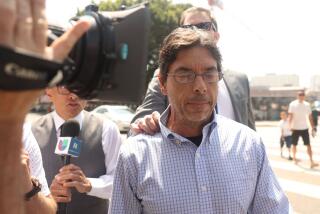Man Who Killed 5 L.A. Gays in 1980s Gets Life Sentence
- Share via
An illegal immigrant who said he grew up a street urchin in a tough border town was sentenced to life in prison Monday in Los Angeles after pleading guilty to murdering five gay men in the late 1980s.
Juan Chavez, 33, confessed to persuading five middle-aged men to take him to their apartments, where he tied them up and then strangled them. Though he told investigators he was angry that homosexuals were spreading AIDS, prosecutors said his motive was robbery--ATM cards, jewels and cars.
“When he was out there to pick up these guys, he was out to rob them,” said Deputy Dist. Atty. Michael Duarte.
However, according to Duarte, Chavez at one point did confess to investigators: “You don’t understand, I want to get these men before they get me. They’re spreading AIDS.”
Chavez was charged with five counts of murder and five counts of robbery in 1994. At the time, he was serving time in Folsom State Prison for kidnapping.
Early this year, at the beginning of the trial, Chavez pleaded guilty to the murder charges to avoid a possible death sentence. The robbery charges had been dropped because they were too old to be prosecuted. In Los Angeles Superior Court, Judge Jacqueline Connor sentenced Chavez to five life sentences without the possibility of parole.
Chavez met his victims at well-known gay pickup spots, according to court records. Men looking to have sex offered him money in Echo, Elysian, LaFayette and MacArthur parks, though he did not dress or act like a prostitute, said his attorney, Ralph A. Courtney III.
His first known victim, according to prosecutors, was Alfred Rowswell, 46, who was found strangled in his LaFayette Park apartment in July 1986. Rowswell’s car was found later that year in Utah, but fingerprints on the windows initially proved inconclusive, Duarte said.
Then in 1989, Chavez killed four men in two months: Ruben Panis, 57, of Los Angeles; Donald Leeman, 48, of Los Angeles; Michael Cates, 46, of West Hollywood; and Leo Hildebrand, 52, of Alhambra.
Los Angeles police detectives found a photo of a man using one of the victims’ ATM cards and circulated it at local gay bars. But without more evidence the cases went nowhere.
The break for detectives came in 1994, when they finally matched a fingerprint on Rowswell’s car to a prisoner in Washington state. The inmate said he got the car from Chavez.
Detectives quickly matched the ATM photo to Chavez’s half brother, whom they took into custody but never arrested. On Dec. 14, they interviewed Chavez in prison. The suspect was worried about his brother being implicated in the murders and confessed the following day, according to court records. His half brother was never charged in the crimes.
According to police, the defendant said: “I thank God you guys found out about this, because you know what, that way I can clear my mind. My conscience has been bothering me for a long time.”
Courtney later asked the judge not to use Chavez’s confession as evidence. He said the defendant was coerced into giving it because he was afraid that his half brother would be arrested. The judge denied the request.
Courtney said Chavez and his half brother had been left with their grandmother as young children. After the woman hit Chavez with a pipe, the two became runaways in Ciudad Juarez, Mexico.
They crossed the border to Texas and then moved to California. Chavez had a wife and two children. He worked a series of low-level jobs, from dishwasher to steam-iron operator, in Los Angeles and committed a string of petty crimes, Duarte said.
“He was just a crook, stealing what he had to steal,” said Duarte.
More to Read
Sign up for Essential California
The most important California stories and recommendations in your inbox every morning.
You may occasionally receive promotional content from the Los Angeles Times.













